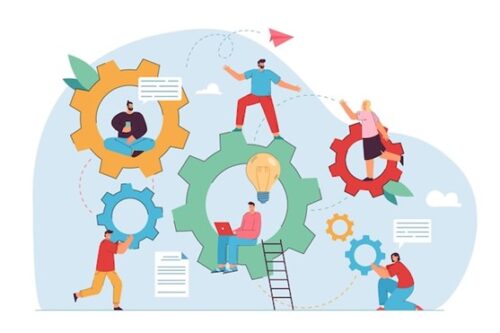The mining industry in Darwin plays a crucial role in the economic growth of the region. To maximize productivity and improve performance, companies are increasingly turning to HBDI assessment in Darwin. The HBDI assessment, which stands for Herrmann Brain Dominance Instrument, is a tool that helps individuals and teams understand thinking preferences Darwin their employees and how they can leverage these preferences to enhance communication, problem-solving, and decision-making. By applying the insights gained from the HBDI assessment, mining companies in Darwin can create a more harmonious and efficient work environment, leading to increased productivity and profitability. With the HBDI assessment in Darwin, organizations can identify the strengths and weaknesses of their employees, allocate tasks accordingly, and foster a culture of collaboration and innovation. This assessment also helps in identifying potential leaders and providing them with the necessary training and development opportunities. Overall, the impact of HBDI assessment in the Darwin mining industry is significant, as it enables companies to optimize their workforce’s capabilities and enhance overall productivity.
In this article, we will explore how the Herrmann Brain Dominance Instrument (HBDI) assessment can help in maximizing productivity in the Darwin mining industry.
Understanding the HBDI assessment and its relevance in the mining industry
The HBDI assessment is a powerful tool that helps individuals understand their thinking preferences and cognitive styles. It is based on the concept that individuals have different ways of thinking and processing information. The assessment identifies four thinking preferences: analytical, practical, relational, and experimental. By understanding these preferences, individuals can enhance their decision-making, problem-solving, and communication skills.
The relevance of HBDI assessment in the mining industry lies in its ability to improve collaboration and teamwork among employees. In a mining operation, various teams and departments need to work together seamlessly to achieve optimal results. By understanding their thinking preferences, employees can better appreciate the diverse perspectives and leverage the strengths of each team member. This leads to improved communication, problem-solving, and ultimately, higher productivity.
The impact of thinking preferences Darwin employees and productivity in the mining industry
Thinking preferences have a significant impact on productivity in the mining industry. Different tasks and roles require different thinking styles. For example, analytical thinking is crucial in data analysis and risk assessment, while practical thinking is valuable in operational planning and execution. Understanding the thinking preferences of employees allows organizations to assign tasks and roles that align with their strengths, leading to increased efficiency and effectiveness.
Moreover, thinking preferences also influence how individuals approach challenges and solve problems. By leveraging the diverse thinking styles within a team, organizations can develop innovative solutions and overcome complex issues more effectively. This not only enhances productivity but also fosters a culture of continuous improvement and learning within the mining industry.
Benefits of HBDI assessment in the Darwin mining industry
The benefits of HBDI assessment in the Darwin mining industry are manifold. Firstly, the assessment helps in identifying and developing talent within the workforce. By understanding the thinking preferences of employees, organizations can identify individuals who possess the skills and aptitude for leadership and critical roles. This allows for targeted training and development programs to nurture these talents, leading to a more skilled and capable workforce.
Secondly, HBDI assessment helps in improving communication and reducing conflicts in the workplace. By understanding the thinking preferences of colleagues and team members, individuals can adapt their communication style to ensure effective and meaningful interactions. This promotes collaboration, reduces misunderstandings, and enhances productivity by fostering a positive work environment.
Furthermore, HBDI assessment also aids in employee engagement and job satisfaction. When individuals are aware of their thinking preferences and are given opportunities to work in roles that align with their strengths, they are more likely to be motivated and satisfied with their work. This, in turn, leads to higher productivity and retention rates within the Darwin mining industry.
In the fast-paced and competitive Darwin mining industry, maximizing productivity is crucial for success. One way to achieve this is through the use of HBDI assessment, which helps identify thinking preferences Darwin employees and how they process information. By understanding these preferences, companies can create teams that are well-balanced and diverse in their thinking styles. This can lead to enhanced problem-solving abilities, improved communication, and increased innovation within the organization. Furthermore, by aligning individuals’ thinking preferences with their roles and responsibilities, companies can ensure that employees are working in areas that capitalize on their strengths and natural ways of thinking. Overall, the implementation of HBDI assessment in the Darwin mining industry can have a significant impact on productivity and ultimately contribute to the success of mining operations.
Implementing HBDI assessment in mining operations
Implementing HBDI assessment in mining operations requires a systematic and structured approach. Firstly, organizations need to partner with experienced HBDI assessment providers who understand the unique requirements and challenges of the mining industry in Darwin. These providers can design customized assessment programs that align with the specific needs of the organization.
Secondly, proper training and support should be provided to employees to ensure they understand the purpose and benefits of the HBDI assessment. This includes educating them on the concept of thinking preferences, how the assessment works, and how the results can be used to enhance productivity and teamwork.
Lastly, organizations should integrate the HBDI assessment results into their talent management and development programs. This includes identifying high-potential employees, designing career paths that align with their thinking preferences, and providing targeted training and development opportunities to nurture their skills and capabilities.
Training programs for HBDI assessment in the mining industry in Darwin
To ensure successful implementation of HBDI assessment in the Darwin mining industry, organizations can avail themselves of training programs specifically designed for the mining sector. These programs provide employees with the necessary knowledge and skills to understand and utilize the HBDI assessment effectively.
Training programs typically include sessions on the fundamentals of thinking preferences, the HBDI assessment process, interpreting assessment results, and practical applications of the assessment in the mining industry. These programs are often delivered by experienced trainers who have a deep understanding of the mining sector and can tailor the content to meet the specific needs of the industry.
By participating in these training programs, employees can develop a comprehensive understanding of the HBDI assessment and its relevance in the Darwin mining industry. This enables them to leverage the assessment results for personal and professional growth, leading to improved productivity and performance.
Challenges and limitations of using HBDI assessment in the mining industry
While the HBDI assessment offers numerous benefits, it is essential to acknowledge the challenges and limitations associated with its usage in the mining industry. One key challenge is the resistance to change and the potential reluctance of employees to embrace the assessment. Some individuals may be skeptical about the effectiveness of the assessment or may fear the implications of revealing their thinking preferences. Overcoming this resistance requires effective communication, transparency, and a clear demonstration of the benefits of the assessment.
Another limitation is the potential for oversimplification of individuals’ thinking preferences. The HBDI assessment categorizes individuals into four distinct thinking preferences, but it is essential to recognize that human thinking is complex and cannot be fully captured by these categories alone. The assessment should be viewed as a starting point for understanding thinking preferences rather than a definitive representation.
Additionally, the HBDI assessment should not be seen as a standalone solution for productivity improvement in the mining industry. It should be integrated into a broader organizational strategy that includes other measures such as continuous training and development, process optimization, and the implementation of technological advancements.
Future trends in HBDI assessment in the Darwin mining industry
As the Darwin mining industry continues to evolve, the future of HBDI assessment holds several exciting possibilities. One trend is the integration of technology into the assessment process. Advancements in artificial intelligence and data analytics can enhance the accuracy and efficiency of the assessment, allowing for more precise identification of individuals’ thinking preferences.
Another trend is the customization of the assessment to meet the specific needs of different mining operations. By tailoring the assessment to the unique characteristics of each organization, the results can be more effectively utilized to drive productivity and performance.
Furthermore, the integration of HBDI assessment with other tools and methodologies, such as lean management and Six Sigma, can provide a holistic approach to productivity improvement in the mining industry. By combining multiple approaches, organizations can leverage the strengths of each method and address the complex challenges faced in the industry.
Conclusion
The mining industry in Darwin plays a crucial role in the economic growth of the region. To maximize productivity and efficiency in this industry, companies are increasingly turning to HBDI assessment. HBDI stands for Herrmann Brain Dominance Instrument, which is a tool used to measure thinking preferences Darwin mining industry employees and cognitive styles. By understanding individual thinking preferences, mining companies in Darwin can better align tasks and responsibilities with employees’ strengths and cognitive abilities. This results in improved decision-making, problem-solving, and overall productivity in the mining industry. HBDI assessment in Darwin has become an integral part of talent management strategies, helping companies to optimize their workforce and achieve their business goals.
Maximizing productivity in the Darwin mining industry is crucial for the sustainable growth and success of the sector. The HBDI assessment offers a powerful tool to enhance productivity by understanding individuals’ thinking preferences and leveraging their strengths. By implementing HBDI assessment in mining operations, organizations can improve collaboration, communication, and problem-solving capabilities, leading to increased efficiency and effectiveness.
To benefit from HBDI assessment in the mining industry, organizations should partner with experienced providers who can design customized assessment programs and provide appropriate training and support. By embracing HBDI assessment, the Darwin mining industry can unlock its full potential and thrive in an increasingly competitive environment.
Contact WHS and Training Compliance Solutions for more information on how HBDI assessment can benefit the mining industry Darwin.












